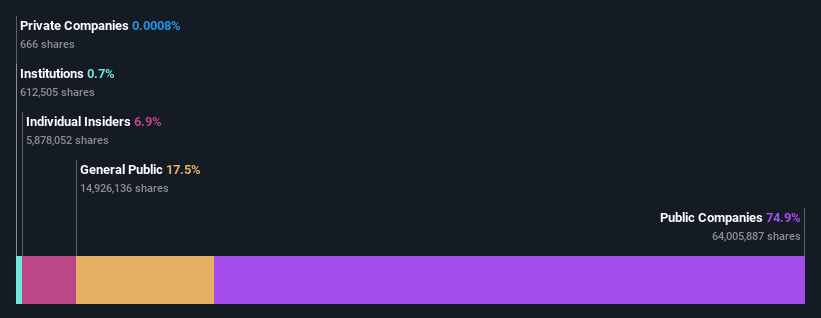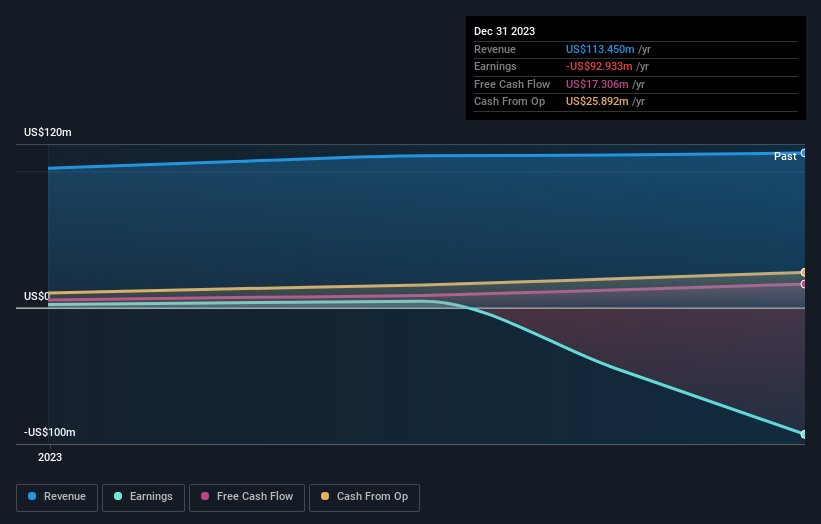Public companies are Gyre Therapeutics, Inc.'s (NASDAQ:GYRE) biggest owners and were rewarded after market cap rose by US$137m last week
Key Insights
Significant control over Gyre Therapeutics by public companies implies that the general public has more power to influence management and governance-related decisions
The largest shareholder of the company is GNI Group Ltd. with a 75% stake
Ownership research, combined with past performance data can help provide a good understanding of opportunities in a stock
A look at the shareholders of Gyre Therapeutics, Inc. (NASDAQ:GYRE) can tell us which group is most powerful. With 75% stake, public companies possess the maximum shares in the company. Put another way, the group faces the maximum upside potential (or downside risk).
Clearly, public companies benefitted the most after the company's market cap rose by US$137m last week.
Let's take a closer look to see what the different types of shareholders can tell us about Gyre Therapeutics.
See our latest analysis for Gyre Therapeutics
What Does The Lack Of Institutional Ownership Tell Us About Gyre Therapeutics?
Small companies that are not very actively traded often lack institutional investors, but it's less common to see large companies without them.
There could be various reasons why no institutions own shares in a company. Typically, small, newly listed companies don't attract much attention from fund managers, because it would not be possible for large fund managers to build a meaningful position in the company. Alternatively, there might be something about the company that has kept institutional investors away. Gyre Therapeutics might not have the sort of past performance institutions are looking for, or perhaps they simply have not studied the business closely.
Gyre Therapeutics is not owned by hedge funds. GNI Group Ltd. is currently the company's largest shareholder with 75% of shares outstanding. This implies that they have majority interest control of the future of the company. For context, the second largest shareholder holds about 3.4% of the shares outstanding, followed by an ownership of 3.3% by the third-largest shareholder. Note that the second and third-largest shareholders are also President and Chairman of the Board, respectively, meaning that the company's top shareholders are insiders.
While it makes sense to study institutional ownership data for a company, it also makes sense to study analyst sentiments to know which way the wind is blowing. Our information suggests that there isn't any analyst coverage of the stock, so it is probably little known.
Insider Ownership Of Gyre Therapeutics
The definition of an insider can differ slightly between different countries, but members of the board of directors always count. The company management answer to the board and the latter should represent the interests of shareholders. Notably, sometimes top-level managers are on the board themselves.
Insider ownership is positive when it signals leadership are thinking like the true owners of the company. However, high insider ownership can also give immense power to a small group within the company. This can be negative in some circumstances.
Our most recent data indicates that insiders own some shares in Gyre Therapeutics, Inc.. It is a pretty big company, so it is generally a positive to see some potentially meaningful alignment. In this case, they own around US$101m worth of shares (at current prices). Most would say this shows alignment of interests between shareholders and the board. Still, it might be worth checking if those insiders have been selling.
General Public Ownership
With a 17% ownership, the general public, mostly comprising of individual investors, have some degree of sway over Gyre Therapeutics. While this size of ownership may not be enough to sway a policy decision in their favour, they can still make a collective impact on company policies.
Public Company Ownership
We can see that public companies hold 75% of the Gyre Therapeutics shares on issue. It's hard to say for sure but this suggests they have entwined business interests. This might be a strategic stake, so it's worth watching this space for changes in ownership.
Next Steps:
It's always worth thinking about the different groups who own shares in a company. But to understand Gyre Therapeutics better, we need to consider many other factors. For instance, we've identified 2 warning signs for Gyre Therapeutics (1 is concerning) that you should be aware of.
Of course this may not be the best stock to buy. So take a peek at this free free list of interesting companies.
NB: Figures in this article are calculated using data from the last twelve months, which refer to the 12-month period ending on the last date of the month the financial statement is dated. This may not be consistent with full year annual report figures.
Have feedback on this article? Concerned about the content? Get in touch with us directly. Alternatively, email editorial-team (at) simplywallst.com.
This article by Simply Wall St is general in nature. We provide commentary based on historical data and analyst forecasts only using an unbiased methodology and our articles are not intended to be financial advice. It does not constitute a recommendation to buy or sell any stock, and does not take account of your objectives, or your financial situation. We aim to bring you long-term focused analysis driven by fundamental data. Note that our analysis may not factor in the latest price-sensitive company announcements or qualitative material. Simply Wall St has no position in any stocks mentioned.


